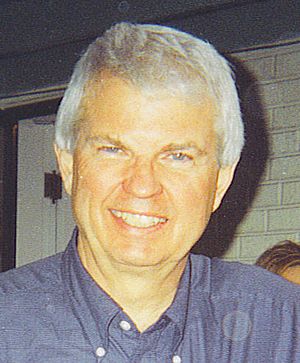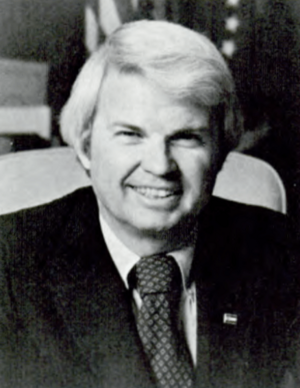Richard Lamm facts for kids
Quick facts for kids
Richard Lamm
|
|
|---|---|
 |
|
| 38th Governor of Colorado | |
| In office January 14, 1975 – January 13, 1987 |
|
| Lieutenant | George L. Brown Nancy E. Dick |
| Preceded by | John Vanderhoof |
| Succeeded by | Roy Romer |
| Personal details | |
| Born |
Richard Douglas Lamm
August 3, 1935 Madison, Wisconsin, U.S. |
| Died | July 29, 2021 (aged 85) Denver, Colorado, U.S. |
| Political party | Democratic |
| Other political affiliations |
Reform (1996) |
| Spouse |
Dottie Vennard
(m. 1963) |
| Education | University of Wisconsin, Madison (BA) University of California, Berkeley (JD) |
| Military service | |
| Allegiance | |
| Branch/service | |
| Years of service | 1957–1959 |
| Rank | First Lieutenant |
Richard Douglas Lamm (born August 3, 1935 – died July 29, 2021) was an American politician, writer, and lawyer. He was the 38th Governor of Colorado for three terms, from 1975 to 1987. He was a member of the Democratic Party. Later, in 1996, he tried to become the Reform Party's candidate for President of the United States.
He was also an accountant and helped lead a public policy group at the University of Denver.
Contents
Early Life and Education
Richard Douglas Lamm was born on August 3, 1935, in Madison, Wisconsin. His father was Edward Arnold Lamm, who worked for a coal company. Richard went to Mt. Lebanon Sr. High School near Pittsburgh, Pennsylvania.
He then studied accounting at the University of Wisconsin–Madison. During his college summers, he worked different jobs. He was a lumberjack (someone who cuts down trees) in Oregon, a stockboy (someone who organizes goods) in New York, and helped on an ore boat (a ship that carries minerals).
Richard graduated from college in 1957. After that, he served one year in the United States Army as a first lieutenant. He was stationed at Fort Carson in Colorado and Fort Eustis in Virginia. In 1958, he switched to reserve duty.
From 1958 to 1960, Lamm lived in different cities like Salt Lake City, San Francisco, and Berkeley, California. He worked as an accountant and a law clerk during this time.
He went to law school at the University of California and finished in 1961. In 1962, he moved to Denver, Colorado. There, he worked as an accountant and then started his own law practice. He loved the Colorado lifestyle and became an active skier, mountain climber, and hiker. He joined the Colorado Mountain Club. In 1969, he started teaching at the University of Denver and stayed connected with the university for many years.
In 1963, Richard married Dottie Vennard, who used to be a flight attendant. In 1998, Dottie ran for the United States Senate from Colorado but did not win.
In 1974, Time Magazine named Lamm one of "200 Young Leaders of America." He also won an essay contest called "Peace 2020" in 1985. In 1992, he was honored as one of the "Colorado 100" for his important contributions to the state's history.
Political Career
Serving in Colorado
In 1964, Richard Lamm was elected to the Colorado House of Representatives as a Democrat from Denver. He was an early supporter of the environmental movement. He also led the first national meeting on population and the environment.
In 1972, Lamm led a group that opposed Denver hosting the 1976 Winter Olympics. Even though Denver had already been chosen, his group successfully stopped public money from being used for the games. This forced Denver to cancel its plans, and another city, Innsbruck, Austria, hosted instead. This effort made Lamm well-known across Colorado.
Becoming Governor
In 1974, Lamm ran for Governor of Colorado. His main idea was to limit growth in the state. To show he was against expensive campaigns, he walked across the state during his campaign. He was elected governor.
One of his actions as governor was naming musician John Denver as the Poet Laureate of Colorado. This is an official title given to a poet or songwriter.
As governor, Lamm had strong views on the environment. He once said he would "drive a silver stake" through plans for a new highway, Interstate 470, around Denver. He meant he would stop it for environmental reasons. However, as the area grew, traffic became a big problem. The highway was later built, mostly with state money, and is now called Colorado State Highway 470.
Lamm was sometimes called "Governor Gloom." This was because he made serious predictions about the future of Social Security and health care. He once said, "We've got a duty to die and get out of the way... and let the other society, our kids, build a reasonable life." He explained he was talking about the human condition, not trying to be mean to older people.
Lamm was elected governor of Colorado three times. He served for twelve years, from 1975 to 1987. When he left office, he was the longest-serving governor in Colorado's history. His successor, Roy Romer, later matched this record.
Later Campaigns
In 1990, some Democratic leaders in Colorado wanted Lamm to run for the United States Senate. But Lamm decided not to. In 1992, he did run for the U.S. Senate, but he lost in the Democratic primary election to Ben Nighthorse Campbell. This was his first political defeat.
In 1996, Lamm decided to run for President of the United States. He was still a Democrat, but he criticized both the Democratic and Republican parties. He said that both parties were too influenced by special interest money. He announced he would seek the nomination of the Reform Party.
The Reform Party was started by Ross Perot. Perot also decided to run for president as the Reform Party nominee. Lamm chose former California congressman Ed Zschau as his running mate. In the end, Ross Perot won the Reform Party's nomination.
Writer and Public Speaker
Richard Lamm was also a very active writer. In 1985, while he was still governor, he wrote a novel called 1988. The story was about a former Democratic governor running for U.S. President as a third-party candidate. The main character had many similarities to Lamm himself.
Lamm wrote many other books and articles. These covered topics like population, the environment, and health care. Some of his works include Population and the Law (1972), The Angry West: A Vulnerable Land and Its Future (1982), and Immigration Time Bomb: The Fragmenting of America (1985).
After leaving office, Lamm continued to speak publicly about important issues. He focused on environmentalism, especially population control, limiting immigration, and improving health care.
In 2004, Lamm tried to join the board of directors of the Sierra Club, an environmental organization. He believed the Sierra Club should support immigration controls to help protect the environment from population growth.
He also served as the Chairman of the Advisory Board for the Federation for American Immigration Reform (FAIR). He was also a co-director of the Institute for Public Policy Studies at the University of Denver.
One of his books, The Brave New World of Health Care, criticized health care policies in the United States and offered ideas for how to fix them.
In 2005, a speech Lamm gave in 2004 became very popular through email. It was titled "I Have a Plan to Destroy America," and in it, he criticized multiculturalism.
In 2006, he gave another speech about his book, Two Wands, One Nation. In this speech, he suggested that Black and Hispanic Americans should adopt "Japanese or Jewish values." This idea was criticized by many groups and leaders in his own political party.
Death
Richard Lamm passed away on July 29, 2021, in Denver. He died from problems caused by a pulmonary embolism, which is a blockage in an artery in the lungs. He died one week before his 86th birthday.
Images for kids
 | James B. Knighten |
 | Azellia White |
 | Willa Brown |




